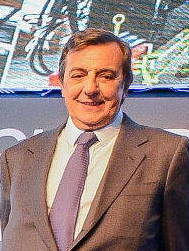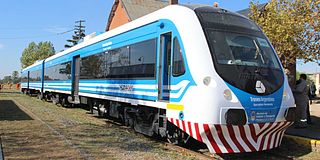Related Research Articles
Rambler is an automobile brand name that was first used by the Thomas B. Jeffery Company between 1900 and 1914.

International Indústria Automotiva da América do Sul Ltda. is a Brazilian company specialised in the manufacturing of diesel engines for automotive applications. Until 2005, it was known as MWM Motores Diesel Ltda.

Lists of automobile-related articles cover a wide range of topics related to cars. The lists are organized by manufacturer, region, sport, technology and so on.

Industrias Kaiser Argentina S.A. was an Argentine automobile manufacturer established in 1956 as a joint venture with Kaiser Motors of the United States. Headquartered in Santa Isabel, Córdoba, the automaker produced a variety of Kaiser Jeep vehicles and American Motors Corporation (AMC) models, including Argentina's most iconic car, the Torino, before partnering with France's Renault, which bought it out in 1970.

The Argentine Ford Falcon is a car built by Ford Argentina from 1962 to 1991. Mechanically, it was based on the parent company's first generation Falcon. The Falcon retained the same body style throughout its production, with several substantial facelifts taking place during its lifespan, giving it a more European flavour and bringing it into line with other more contemporary Fords. However, several decades later, it was apparent that it was a 1960s design wearing a 1980s grille. Falcons are still raced in the Turismo Carretera stock car racing series.
General Motors Colmotores S.A. is a Colombian automobile manufacturer based in Bogotá and has been the local subsidiary of General Motors since 1979. Established in 1957 as "Fábrica Colombiana de Automotores S.A." ", they began manufacturing Austin vehicles under license of BMC. In 1965, US-based corporation Chrysler took a 60% stake in the company, which manufactured Chrysler cars under license until 1979. In 1979, General Motors took control of the company, purchasing a 77.4% stake.

Luis María Ureta Sáenz Peña is an Argentine businessman and diplomat. He was the Argentine Ambassador to France since 2007, and formerly headed the operations of Peugeot-Citroën in Argentina.

The automotive industry in Pakistan is one of the smallest but fastest-growing industries in the country, growing by 171% between 2014 and 2018. It accounts for 3% of Pakistan's GDP and employed a workforce of over 3.5 million people as of 2018. Pakistan is the 35th largest producer of automobiles. Its contribution to the national exchequer is nearly Rs. 50-billion. Pakistan's auto market is among the smallest but fastest growing in Asia. 269,792 cars were sold in 2018, but this number declined to 186,716 in 2019 due to austerity measures. In the 1990s and early 2000s, Pakistan had many Japanese cars. With the launch of the first Auto Policy in 2005, Pakistan launched its first indigenous car, Adam Revo. However, after the 2008 elections, the dollar started depreciating, and due to bad governance, many automakers began to halt production, with some exiting Pakistan. Currently, the auto market is dominated by Honda, Toyota, and Suzuki. However, on 19 March 2016, Pakistan passed a second "Auto Policy 2016-21," which offers tax incentives to new automakers to establish manufacturing plants in the country. In response, Renault, Nissan, Proton Holdings, Kia, SsangYong, Volkswagen, FAW, and Hyundai have expressed interest in entering the Pakistani market. MG JW Automobile Pakistan has signed a memorandum of understanding (MoU) with Morris Garages (MG) Motor UK Limited, owned by SAIC Motor, to bring electric vehicles to Pakistan. NLC signed an agreement with Mercedes Benz to manufacture Mercedes Actros trucks in Pakistan. Pakistan has not enforced any automotive safety standards or model upgrade policies. A few older vehicle models, including the Bolan and Ravi, continue to be sold by Suzuki. On 8 July 2021, Jolta Electric launched the production of electric motorcycles.

The automotive industry in Canada consists primarily of assembly plants of foreign automakers, most with headquarters in the United States or Japan, along with hundreds of manufacturers of automotive parts and systems, a sector represented by the APMA.

The Brazilian automotive industry is coordinated by the Associação Nacional dos Fabricantes de Veículos Automotores (Anfavea), created in 1956, which includes automakers with factories in Brazil. Anfavea is part of the Organisation Internationale des Constructeurs d'Automobiles (OICA), based in Paris. In 2021, the annual production exceeded 2.2 million vehicles, the 8th largest in the world.
This article provides an overview of the automotive industry in countries around the world.

Industrias Aeronáuticas y Mecánicas del Estado was a state-owned entity and autarchic conglomerate of factories of Argentina created in 1951 to promote the manufacture of aircraft and automobiles during the Juan Perón administration.
Sevel Argentina S.A. was an Argentine automobile company established in 1981 that produced and marketed Fiat, Peugeot, Alfa Romeo, Chevrolet, and Citroën vehicles for the local market until it was dissolved in 1999. The company was created by merging Fiat's and Peugeot's Argentine operations.

Mirgor is an Argentinean company that produces electronics, mobile and automotive components, and exports agricultural products. The company's administrativea headquarters are located in the city of Buenos Aires,. while its factory is in Río Grande, Tierra de Fuego. electronics and automotive components, and exports, distributes and commercializes agricultural products. The company's administrative headquarters are located in the city of Buenos Aires, while its factories are in Río Grande, Tierra de Fuego.
Since 2007, Slovakia has been the world's largest producer of cars per capita, with a total of 1 080 000 in 2018 cars manufactured alone in a country with 5 million people. With production of more than a million cars in 2016, Slovakia was 20th in the list of worldwide car production by country and the 7th largest car producer in the European Union. Car manufacture is the largest industry in Slovakia with a share of 12% on the Slovak GDP in 2013 which was 41% of industrial production and 26% of Slovakia's export. 80,000 people were employed in the automotive industry in 2014. 1,500 people were employed when Jaguar Land Rover started production in Nitra in 2018.

Materfer is an Argentine manufacturer of railway and road vehicles, located in the city of Ferreyra in Córdoba Province. The company was established by Fiat Concord in the late 1950s, being its subsidiary until 1980 when Sevel Argentina took over Fiat vehicles.

The automotive industry in Croatia employs about 10,000 people in over 130 companies. AD Klaster, members of the Croatian Association of Automotive Parts Manufacturers at the Industry sector of the Croatian chamber of economy employs about 6000 employees and generates profit of about US$600 million. There are also other companies which are not a part of AD Klaster, like AVL, Cetitec, Saint Jean Industries, König metal, Lipik Glas, Nexus, Yazaki, LTH, Multinorm, Institut RT-RK, Galo industries, and others.

Fiat SOMECA Concord S.A.C.I was the Argentina subsidiary of Italian automotive manufacturer Fiat Automobiles S.p.A. and the first manufacturer of Fiat vehicles in the country. Established in 1954, the factory produced not only automobiles but railway vehicles through its subsidiary Materfer. Some of Fiat Concord's most emblematic products included the 600, 128, and the 1500 coupé designed by Vignale.
Citroën Chile S.A.C., previously known as Citroën Chilena S.A, is the Chilean subsidiary of French automotive manufacturer Citroën which specializes in the sales and distribution of Citroën automobiles in Chile. Until 1982, it also produced vehicles of the brand in the country.
References
- ↑ Home | Asociación de Fabricantes de Automotores (ADEFA)
- ↑ ::: Materfer :::
- ↑ "Fábrica de carrocerías de buses y camiones (Terminal Automotriz) | Tecnología Avanzada en Transporte S.A. - TATSA". Archived from the original on 2016-11-23. Retrieved 2019-05-09.
- ↑ Helvética remolques
- ↑ :: Establecimiento PurSang Argentina ::